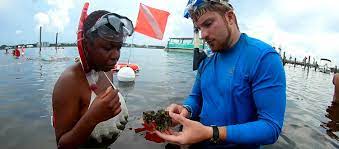DISL - Discover Hall - Residential Marine Science Class
March 15, 2021
DHP anticipates offering a full schedule of summer camps, classes, and programs. However, given the continuing uncertainty in the pandemic, programs, schedules, and activities may be changed. Please know that we will let you know of these changes in a timely fashion and that all program deposits will be 100% refundable if the changes prevent participation. Thank you for your understanding.
2021 Dates: June 20 through July 16
Cost: $2,250
Application Deadline: April 1, 2021
The Residential Marine Science Class is an immersive 4-week academic class that introduces high school students to the field of marine science. The course gives students a better understanding and appreciation of the various disciplines in marine biology and oceanography.
Students live on campus and participate in more than 180 hours of supervised academic activities. Students take part in fieldwork, individual and group assignments, lectures, laboratory investigations, off-campus field trips, research projects, oral presentations, and written and practical examinations.
Topics include:
| Marine ecology |
Fisheries |
| Principles of oceanography |
Marine technology |
| Marine geology |
Barrier island ecology |
| Marine invertebrates |
Salt marsh ecology |
| Marine vertebrates |
Ocean chemistry |
| Estuarine ecology |
Human impacts |
| Plankton biology |
|
Our educational approach is hands-on. Students spend a great deal of time in the field, studying different marine habitats and ecosystems. Field activities correspond to course topics but include, among others, the exploration of the salt marsh community and barrier islands, snorkeling in seagrass beds, and several trips aboard the Dauphin Island Sea Lab's 65-foot research vessel, the
R/V Alabama Discovery. Special field trips include an overnight snorkeling trip to St. Andrew's State Park in Panama City, FL.
Students observe and work with such gear as an otter trawl, bottom dredges, plankton nets, seine nets, water quality profilers, refractometers, spectrophotometers, and water quality test kits. Students collect and identify marine species from various habitats, build and use sampling gear such as ROVs and drifters, participate in lab and field dissections, conduct an individual research project, and are acquainted with careers in marine science through a panel discussion with marine science professionals.
To register, click
here. If you would like to download the registeration form, click
here.
